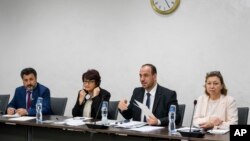Syrian opposition representatives attending the intra-Syrian peace talks report the issue of a transitional government leading to a political settlement to end their country’s brutal six-year long war has been broached for the first time.
Departing from their usual pessimistic outlook, Syrian opposition negotiators are putting a slightly positive spin on what they call substantive discussions with chief U.N. mediator Staffan de Mistura on a future election process.
Head of the High Negotiating Committee (HNC), Nasr al-Hariri, says his delegation has engaged in serious discussions regarding constitutional changes and an 18-month transitional process leading to U.N.-supervised elections for a new government.
“Of course, one session will not be enough to discuss this topic. We hope that the coming meetings we will have further discussions in depth about this topic and we are hopeful that these discussions will not be wasted. On the contrary, we want to build on them in a way that feeds into the political process to reach a political solution,” Hariri said.
The war in Syria, which has entered its seventh year, has killed more than 400,000 people and displaced more than 11 million, inside and outside the country.
HNC spokesman Salem Meslet criticizes the government’s seeming unwillingness to discuss anything except counter-terrorism measures. He said his delegation will consider all issues concerning his country’s future, except for one.
“There is no room for [President] Bashar al-Assad, neither in the transitional period nor in the future of Syria. This is something that everybody must understand and remember. No matter what circumstances or what differences and the conditions will be, this is something that we will not waver on,” Meslet said.
This fixed position by the opposition is unlikely to sit well with the Syrian president, who many observers agree believes he can win the war and the peace on the battlefield.









